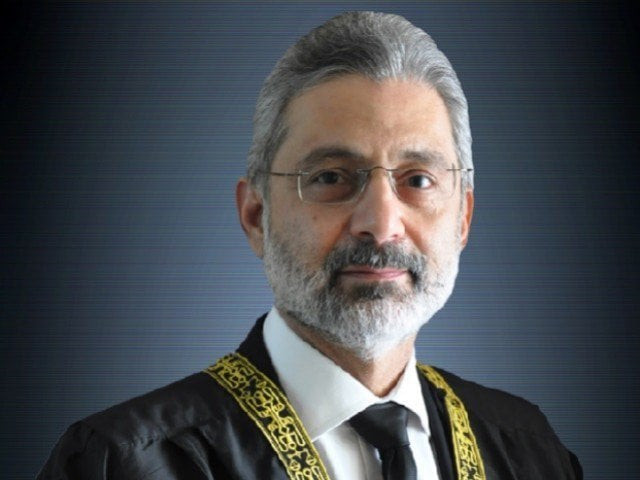SC admits Justice Isa's petition for initial hearing
A larger bench, minus three SJC judges, is likely to be formed after Eid

Justice Qazi Faez Isa. PHOTO: FILE
The SC registrar office did not raise any objection and allotted a number to Justice Isa's constitution petition.
A larger bench will likely hear his petition after Eid.
Three senior-most judges, who are part of the Supreme Judicial Council, will not be included in the larger bench. However, under the Supreme Court Rules 1980, it is discretion of the chief justice of Pakistan to select judges for the larger bench to adjudicate the matter.
Justice Mushir Alam is number one in seniority after the Supreme Judicial Council (SJC) members. However, he will be a part of the council after Justice Sheikh Azmat Saeed's retirement on August 27. After Justice Alam, Justice Umar Ata Bandial and Justice Maqbool Baqar are in the seniority list.
After former chief justice Iftikhar Muhammad Chaudhry, it's for the first time that the SJC is examining a reference against any SC judge.
A senior lawyer said full court minus the SJC members and two judges who would benefit from Justice Isa's removal should not be a part of the larger bench.
A larger bench would decide the maintainability of his plea and later notices might be issued to the respondents. Justice Isa made 13 respondents in his petition.
Senior lawyers; however, were wondering as to why Justice Isa in person was filing a petition and not engaging any lawyer to plead his case.
Though senior lawyer Munir A Malik was in touch with him but he had not been given the green signal to argue Justice Isa's case before the SC.
It is learnt that the Pakistan Bar Council and the Supreme Court Bar Association would also file a constitution petition against the presidential reference in the apex court.
Justice Isa, in his petition, asked the court to dismiss the references filed against him with "malice, ulterior motives and to achieve a collateral purpose". He mainly questioned the conduct of the president, the prime minister, the law minister, the attorney general for Pakistan, the SC registrar etc.
He also argued that the references undermined the independence provided to the judiciary under the Constitution.
The SC judge asked the court to declare the in-camera proceedings of the SJC unlawful and in breach of fundamental rights.
He made both the superior bars— Pakistan Bar Council and the Supreme Court Bar Association—respondents in the 70-page petition.
A total of 13 respondents have been named in the petition, including government functionaries, departments and bars.
He said both references against him were motivated, filed with malice aforethought, filed for ulterior motives, to achieve a collateral purpose and to humiliate, subjugate and browbeat the judiciary, destroy the judiciary's independence and make the judiciary subservient to the executive by subverting the Constitution.
According to Justice Isa, the respondents violated a number of fundamental rights enshrined in the Constitution, including Articles 10A, 12, 14, 19 and 19A, the enforcement whereof was also sought. Without an independent judiciary, the rights of the people, particularly their fundamental rights would be rendered illusory and meaningless.
The constitutional edifice was raised on the principle of separation of powers between the legislature, executive and the judiciary, when the balance was disrupted, the state and ultimately the people suffered.
This petition was not just about the petitioner being an individual judge, but about something far bigger and important.
When the petitioner asked for a copy of Reference No 1 and complained about his character assassination, vilification, defamation and persecution, Reference No 427 emerged, which basically delivered the message that judges and their families "must not complain and suffer in silence".
Justice Isa raised questions over the conduct of Supreme Court Registrar Dr Arbab Arif who is secretary SJC in his case. He also objected to the language used by the AGP in his rejoinder.
About writing letters to the president, Justice Isa referred to his meeting with Chief Justice Asif Saeed Khosa after immediate filing of the reference.
Petitioner met with the chief justice, who is also the chairman of the council, and requested for a copy of Reference No 1, but the request of the petitioner was not acceded to.
The petition stated that Justice Isa was not answerable for his wife or adult-children nor was he under any obligation to disclose any information concerning them.
Under these circumstances, the petitioner was compelled to disclose certain incontrovertible facts about his wife and adult-children, read the petition.



















COMMENTS
Comments are moderated and generally will be posted if they are on-topic and not abusive.
For more information, please see our Comments FAQ